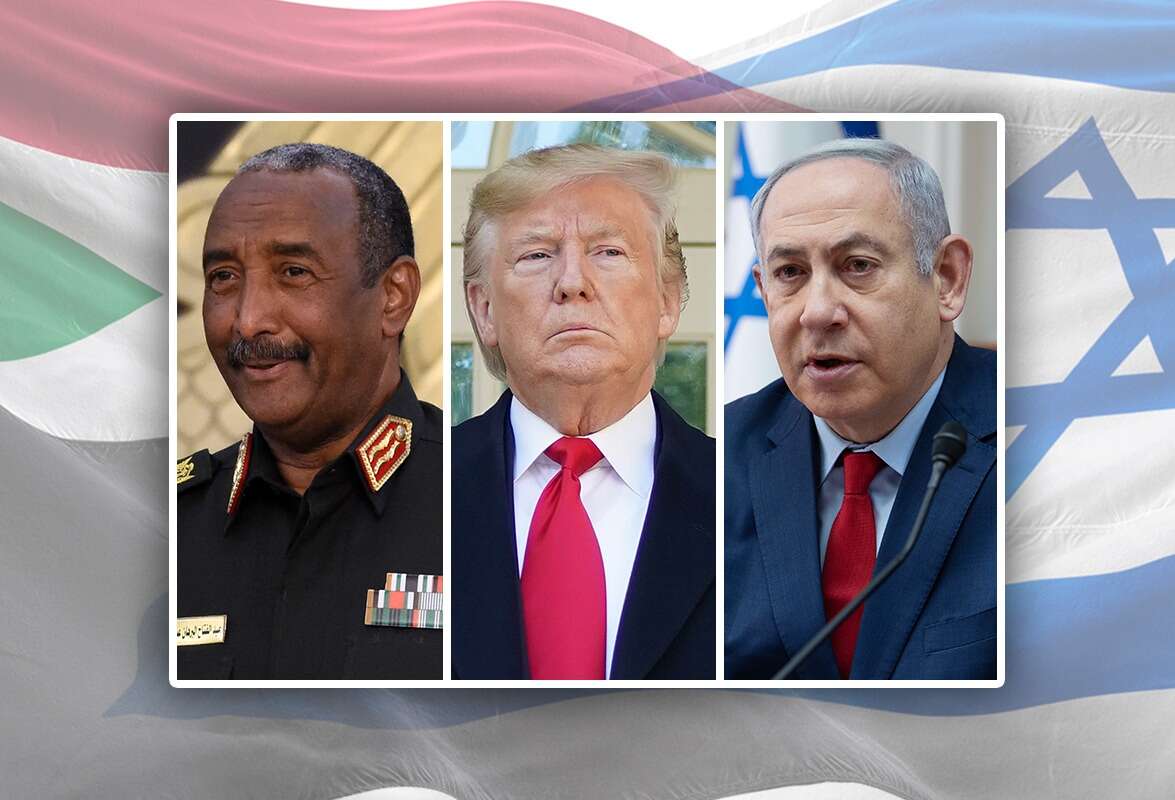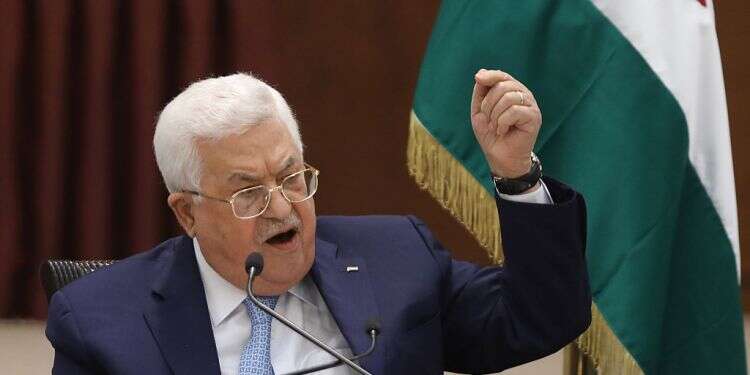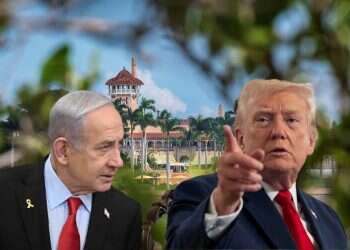Israel hailed a new era in its relations with the Arab world on Friday after the announcement of plans to normalize ties with Sudan – an agreement the Palestinians described as a "new stab in the back".
"This is a new era. An era of true peace. A peace that is expanding with other Arab countries - three of them in recent weeks," Prime Minister Benjamin Netanyahu said in a video statement.
Follow Israel Hayom on Facebook and Twitter
"In Khartoum, the capital of Sudan, the three principles of the Arab League were adopted in 1967: No peace with Israel, no recognition of Israel, and no negotiations with Israel. Whereas today Khartoum says - yes to peace with Israel, yes to recognition of Israel and to normalization with Israel," he exclaimed.
Israel's recent rapprochement with some of its Arab neighbors reflects shifting regional priorities, and shared concerns about Iran.
Netanyahu tweeted about the deal, including in Arabic, and thanked US President Donald Trump for mediating the accord. He said Israeli and Sudanese delegations would soon meet to discuss cooperation in areas including agriculture and trade.

Jewish groups lauded the historic peace treaty.
Chairman of The Jewish Agency for Israel Isaac Herzog issued a statement saying, "The agreement to normalize ties with Sudan brings another Arab nation into the circle of countries choosing peace, progress and prosperity over hostility, hatred and conflict.
"This step will serve to strengthen stability throughout the Middle East. I congratulate President Trump, Prime Minister Netanyahu and the Sudanese leadership on this breakthrough."
The powerful American Israel Public Affairs Committee called the deal "a major breakthrough in eroding tired, old shibboleths that have led to division and conflict."
In a statement, AIPAC called "on other Arab leaders, particularly Palestinian Authority President Mahmoud Abbas, to end their boycott of Israel and engage in negotiations to bring peace and stability to more citizens across the Middle East."
The Conference of Presidents of Major American Jewish Organizations, an umbrella group representing dozens of US Jewish groups, said the treaty "deserves universal support by all who seek peace in the Middle East.
"These landmark diplomatic agreements represent the dawn of a new age for the relationship between the Jewish state and the Muslim world. In normalizing relations with Israel, the United Arab Emirates, Bahrain, and now Sudan pave the way for more Arab and Muslim countries to embrace peace and reconciliation.
"The stubborn reluctance of Palestinian leaders to even discuss peaceful solutions leaves them increasingly out of step with the rest of the Arab and Muslim world. We call upon the Palestinian Authority to heed the wind of change, have a change of heart, choose peace over war, and finally return to the negotiating table," the statement said.
HUGE win today for the United States and for peace in the world. Sudan has agreed to a peace and normalization agreement with Israel! With the United Arab Emirates and Bahrain, that's THREE Arab countries to have done so in only a matter of weeks. More will follow! pic.twitter.com/UHB8H6oaZc
— Donald J. Trump (@realDonaldTrump) October 23, 2020
Democratic Majority for Israel, a US group that lobbies for pro-Israel policies among Democratic Party members, applauded the agreement: "Democratic Majority for Israel congratulates the leaders of Israel and Sudan for establishing diplomatic ties.
"Sudan is the third Arab nation to normalize its relationship with Israel in recent months. This is another important step towards peace and stability in the region. We hope that Palestinian leaders will similarly decide to resume peace talks with Israel in the pursuit of working towards a two-state solution."
'New stab in the back'
Not surprisingly, the Palestinian Authority slammed the deal, saying Friday that it "condemns and rejects" any normalization between Arab countries and Israel.
A statement by Ramallah said that normalization with Israel "is in violation of the Arab summit resolutions and the 2002 Arab Peace Initiative."
Previous statements by the PA condemned the United Arab Emirates and Bahrain for agreeing to establish relations with Israel, drawing sharp criticism from the two Gulf states.
Friday's condemnation, however, was somewhat muted.
"The Palestinian presidency stresses its condemnation and its rejection to the normalization of ties with the state of the Israeli occupation, which occupies the land of Palestine," Abbas' office said a statement.
"No one has the right to speak on behalf of the Palestinian people and the Palestinian issue. The path to a just and comprehensive peace should be based on international law and legitimacy so as to end the Israeli occupation of the land of the State of Palestine and achieve independence for the Palestinian people in their state, with east Jerusalem as its capital – on the 1967 borders.
"The Palestinian leadership will take the necessary decisions to protect the legitimate rights of the Palestinian people."
Palestinian Liberation Front official Wasel Abu Yousef said that Sudan joining "others who normalized ties with the state of the Israeli occupation represents a new stab in the back of the Palestinian people and a betrayal of the just Palestinian cause."
Fatah lawmaker Abbas Zaki said that "Sudan will not gain anything from the normalization accord with Israel."
Gaza Strip-based terrorist groups Hamas and Palestinian Islamic Jihad also condemned the Israel-Sudan peace deal.
Hamas, which rules Gaza, said in a statement, "We express our condemnation and outrage over this despicable and humiliating normalization [deal]. This does not suit Sudan's people and history. We call on the heroic people of Sudan to reject the shameful agreement and the establishment of any ties with the criminal enemy."
Hamas spokesman Sami Abu Zuhri further noted that the agreement was "is not compatible with Sudan's record of supporting the Palestinians."
Islamic Jihad spokesman Daoud Shehab slammed Khartoum for capitulating to US pressure over the deal to secure the removal of Sudan from the US list of state sponsors of terrorism.
"This is a dark day in the history of Sudan," Shehab declared. "The agreement jeopardizes Sudan's future and identity and is a betrayal of the Arabs and Muslims."
According to Arab media reports, the peace deal with Israel did not enjoy a consensus in Sudan, either.
Sudan's former Prime Minister Sadiq al-Mahdi, who heads the National Umma Party – the country's largest political party – slammed the deal.
"The announcement [of a deal with Israel] contradicts Sudanese national law … and contributes to the elimination of the peace project in the Middle East and to preparing for the ignition of a new war," Mahdi said in a statement.
He said the agreement with Israel would jeopardize the authority of Sudan's transitional government, a fragile coalition of civilian and military leaders.
Mahdi accused Trump of being racist against Muslims and Black people, and described Israel as an "apartheid state."
Sudan's acting Foreign Minister Omar Qamar al-Din said Saturday that the ratification of the normalization deal was up to a legislative body, which has yet to be formed.
He said the deal ends the state of hostility with Israel, and it will lead to diplomatic, political, economic and investment connections if approved, according to the state-run SUNA news agency.
"If ratified, the benefits for Sudan will be enormous," he said.
World leader welcome deal, Iran slams move
Iran on Saturday described the US-brokered Sudan-Israel peace deal as "phony" and accused Khartoum of "paying a ransom" in return for Washington removing it from a list of state sponsors of terrorism.
"Pay enough ransom, close your eyes to the crimes against Palestinians, then you'll be taken off the so-called 'terrorism' blacklist," Tehran's Foreign Ministry said on Twitter.
"Obviously, the list is as phony as the US fight against terrorism. Shameful."
The White House announcement on #Sudan couldn't be more symbolic.
Pay enough ransom, close your eyes on the crimes against Palestinians, then you'll be taken off the so-called "terrorism" blacklist.
Obviously the list is as phony as the U.S. fight against terrorism. Shameful!
— Iran Foreign Ministry 🇮🇷 (@IRIMFA_EN) October 24, 2020
UN Secretary-General Antonio Guterres said Saturday welcomed the peace deal and expressed hope it would "further cooperation, enhance economic and trade relations and bring about new opportunities to advance peace and economic prosperity in the wider Horn of Africa and Middle East regions."
Egyptian President Abdel Fattah el-Sissi, whose country in 1979 became the first Arab state to make peace with Israel, lauded the agreement.
"I welcome the joint efforts by the United States of America, Sudan, and Israel regarding the normalization of relations. I value all efforts aimed at achieving regional stability and peace," he tweeted.
The United Arab Emirates, which signed a normalization deal with Israel in September, welcomed Sudan's decision to establish relations too as "historic".
"Sudan's decision to initiate relations with the state of Israel is an important step to enhance security, and prosperity in the region," Abu Dhabi's Foreign Ministry said in a statement to local media.
"This achievement aims to expand the scope of economic, trade, scientific and diplomatic cooperation."
Bahrain, which followed the UAE in striking peace with the Jewish state in September hailed the move.
A government statement underlined the kingdom's support for Sudan's efforts "to exercise an active and constructive role in the international community."
Germany welcomed the deal: "Following Israel's normalization agreements with Bahrain and the United Arab Emirates, this is another important step towards greater stability and a more peaceful relationship between Israel and its Arab neighbors," its Foreign Ministry said.
"The US has played a crucial role in mediating these agreements, for which it deserves thanks and recognition."
Subscribe to Israel Hayom's daily newsletter and never miss our top stories!




